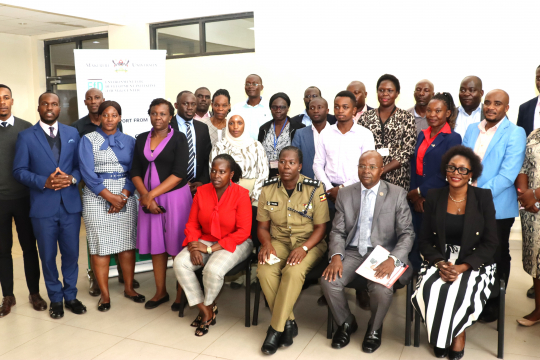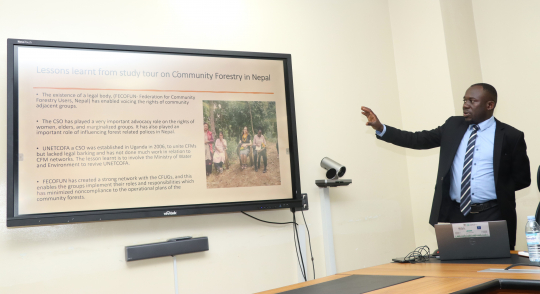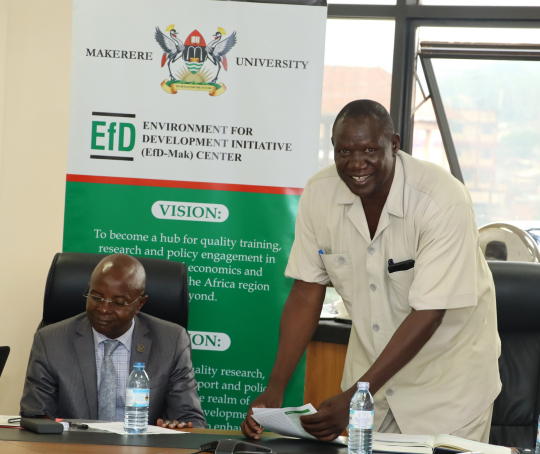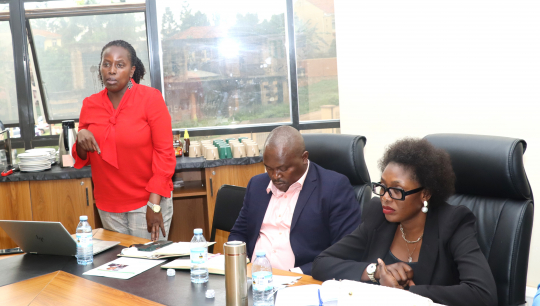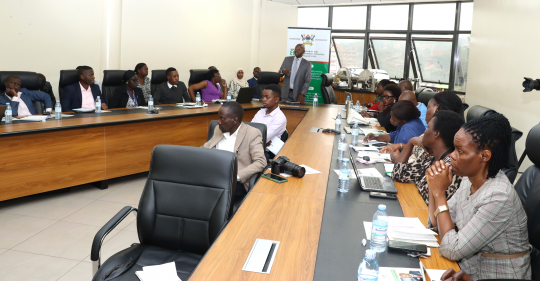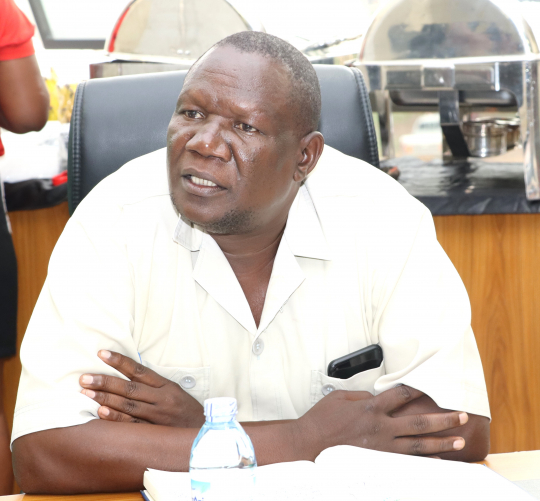A team from EfD Uganda visited the Ministry of Water and Environment on February 27th, 2024 to share what they had learned on a study tour to Nepal in the fall of 2023. Nepal has been a world leader in participatory forest management (PFM) for decades and taking part of their experiences resonated well with the government's ambitions to increase the country’s forest cover.
The forest cover in Uganda has been shrinking for decades, but the Ugandan government aims to increase it from currently 9 % to 24% by 2040. The people of Nepal have been able to increase their forest cover to 45% from 29% in 1992 through community forest management.
The EfD centers in Nigeria, Ghana, and Uganda, had called for knowledge-sharing on community forest management. All three countries are experiencing forest loss with resulting increases in CO2 emissions and other environmental problems. This request resulted in the EfD-funded project Peer learning on community forestry for policymakers and researchers in countries with newer EfD centers.
The Ugandan team comprised EfD researcher Peter Babyenda of Makerere University and Christine Mugyenyi and Rukundo Tom from the National Forest Authority. The study tour was arranged by the EfD Forest Collaborative and aimed at understanding community-based forestry management and sharing ideas and experiences regarding forestry among the participant countries.
Nepal provides a practical example of how the community can be empowered to manage forests and significantly contribute to the general growth of forest cover in the county. The leadership of the forest user groups also acts as a training ground for the national leadership and as a result, the national leadership also participates in the sustainable utilization of forests.
Nepal presents an interesting scenario of demystifying practices in many other countries where local people are seen as enemies of forests. The Community Forest User Groups (CFUG), Nepal’s model demonstrates how local people, are at the forefront of protecting forests in Nepal.
EfD Uganda disseminates study findings to the Ministry of Water and Environment
Research fellows from EfD Uganda at Makerere University visited the Ministry of Water and Environment to disseminate information on lessons learned from Nepal’s community forest management. The workshop hosted by the ministry’s headquarters in Luzira, was attended by over 30 forestry officials from government ministries, departments, and agencies including the National Forest Authority, Uganda World Life Authority, and National Environmental Management Authority.
“Nepal’s model granting legal rights to use and manage forest resources, stands as an exemplary solution against deforestation – a lesson we find particularly relevant given Uganda’s challenges,” said EfD Uganda Center Director Edward Bbaale.
“The presentation today is a timely source of inspiration for policymakers and researchers, demonstrating the positive impact of involving local communities in decision-making and forest management, addressing both environmental concerns and social inequalities,” he said.
Key Lessons from Nepal’s Community Forest Management Model for Uganda
Nepal has about 22,000 community forest user groups benefiting about 2.9 million households. The community manages about 2.2 million hectares of forest.
The existence of a legal body, (FECOFUN - Federation for Community Forestry Users, Nepal) has enabled voicing the rights of community adjacent groups. The Civil Society Organization has played a very important advocacy role on the rights of women, elders, and marginalized groups. It has also played an important role in influencing forest-related policies in Nepal.
UNETCOFA a Civil Society Organization was established in Uganda in 2006, to unite CFMs but lacked legal barking and has not done much work concerning CFM networks. The lesson learned is to involve the Ministry of Water and Environment to revive UNETCOFA.
FECOFUN has created a strong network with the Community Forest User Groups, and this enables the groups to implement their roles and responsibilities which has minimized non-compliance with the operational plans of the community forests. Commitment by the Community Forest User Groups households to protect, restore, and conserve forests has largely been informed by previous calamities like earthquakes and floods which is not the case for Uganda.
Value addition on forest products like timber, fodder, and herbs has increased income and created some jobs for the CFUGs.
Community Forestry in Nepal has thrived on many different models for instance knowledge production and knowledge use in forestry and the presence of a homogenous society. Improving livelihoods where forest conservation meets the demands of local communities provides an overall incentive for sustainable conservation including safeguarding essential ecosystem services.
Having a dynamic, diverse, and respected leadership within community groups increases chances of success as is the case for some Community Forest User Groups in Nepal. The involvement of women in the use of forest resources has given women a voice that allows them to actively participate in conservation activities.
Benefit sharing through wealth ranking to target the poor for support is key and can minimize elite capture. Sharing of benefits/income accrued from the sale of forest products by investing a certain percentage, for instance, 25%, was a key lesson to learn.
Community Forest User Groups coordinating with local government to put up infrastructural development like schools or road construction from the income attained from the sale of forest resources was a key lesson learned.
Community Forestry has contributed to ecosystem functioning through the provision of fresh water supply to households and for agricultural purposes. Most forest-adjacent communities in Nepal access piped water from the forest for both domestic uses including watering animals and irrigation of crops. This has enabled the conservation of water sources and the regulation of waste discharge.
A detailed report on the study findings is attached.
By: Jane Anyango, Communication Officer.
